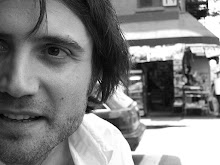These excerpts are from an interview with Brooklyn writer (aren't they all?) John Wray on Gothamist, who just published a new book called Lowboy.
I wanted my third [novel] to be as different as possible from my second. Mainly because— not because of ambition— I just didn't like the idea of always writing the same novel. There are authors I love who always write the same novel, like Ernest Hemingway or Cormac McCarthy. I mean they might not feel that way, Hemingway might have been like, what are you talking about? But from an aesthetic point of view, he was writing the same book over and over. It would drive me insane. It would be like an obsessive person at an asylum darning the same sock.
There's a tradition in film, and there's this thing that's kind of a curse on fiction in the 20th century, I don't know who it was in what writer's workshop who first thought of this "finding your voice" notion. I think it's destructive. I mean I think it's fine for certain writers who are finding a voice they're interested in— but they're choosing a voice, a particular role to inhabit. People with the archetypal voice: Gertrude Stein or James Ellroy or Raymond Chandler. I mean you hear it and you immediately know it's them, it's consistent from book to book. They chose that voice. Kids in creative writing programs are told that there's a single, genuine voice inside them, only one, and that they have to find it. And I think you can really give a kid a complex with that. The truth is you are starting out your career and you have this whole spectrum. You can choose what you want and it'll be your book no matter what. And you can do that again with your next book or you can do something totally fucking different if you want.
I once interviewed Haruki Murakami, which ended up being a great interview, one of the best things I've been involved in. It was a long Paris Review interview, which meant we could spend a long time talking. I'm a huge fan, and the interview process revealed a lot about what goes on behind the screen, and demystified it. One of the interesting things Haruki said was that while he had been interviewing John Irving, of all people— it's like this endless chain of writers interviewing writers— Irving said to Haruki that when you have your readers you want to hook them on your writing. You want to hook your readers on it like a drug. And you want to get them hooked on that particular feeling like you're writing it for them and you want to come back for every one of your books, like a fix. And if anyone was interested in taking on the whole Irving oeuvre, they'd probably see that.... I think there's a certain understanding of supply and demand that pertains to the microcosm of the literary world. With movies, traditionally, a lot of people going to the movies don't know who the director is, which is probably freeing. Authors are innately identified with their books.
Tuesday, May 5, 2009
Subscribe to:
Post Comments (Atom)





No comments:
Post a Comment